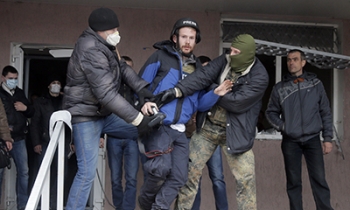The World Association of Newspapers (WAN) and the World Editors Forum (WEF) have protested to Russian President Vladimir Putin against the incarceration of a journalist in a psychiatric hospital for writing an article critical of psychiatric services — a punishment that echoes human rights abuses from the Soviet era.

In a letter to Putin, Paris-based WAN and WEF called for an investigation into the incarceration of Larisa Arap, a journalist and member of the opposition United Civil Front led by Garry Kasparov. Arap had been forcibly hospitalised in Murmansk psychiatric hospital following the publication of an article on the use of violence by medical staff in the treatment of patients at the city’s psychiatric clinics.
In Soviet times, psychiatric hospitals were used as prisons to isolate and punish political prisoners and discredit their ideas.
The two organisaitons asked Putin to authorise an investigation by human rights ombudsman Vladimir Lukin and presidential human rights adviser Ella Panfilova.
On July 5, when Arap visited a psychiatric clinic to collect some papers, a doctor reportedly called for the police and an ambulance. Arap had her hands bound and was taken to Murmansk psychiatric hospital. Although doctors are required to notify patients’ relatives of forcible hospitalisation within 24 hours, Arap’s family was only informed on July 24. When her family submitted a written request for information regarding her diagnosis, it was refused as being confidential, even though the family has a right to be informed, WAN/WEF said.
"We are seriously concerned that Arap is being punished for her journalism activities and is being held against her will on invalid grounds. We respectfully ask that you do everything possible to ensure that that this case is immediately and impartially investigated by human rights ombudsman Vladimir Lukin and presidential human rights adviser Ella Panfilova," they said.
The Soviet Union routinely locked up dissidents in asylums, a practice that attracted worldwide condemnation because of the protests of Andrei Sakharov and other human-rights activists, the Chicago Tribune commented. Today, 16 years after the Soviet collapse, authorities are increasingly returning to psychiatry to suppress political opponents or punish activists, according to human-rights organizations and other watchdog groups.
The trend reflects a government that has yet to fully divest itself from a Soviet way of thinking and governing, says Yuri Savenko, president of the Independent Psychiatric Association of Russia. "We're returning to this Soviet scenario when psychiatric institutions are used as punitive instruments," Savenko told the Tribune. "I call this not even punitive psychiatry but police psychiatry, when the main aim is to protect the state rather than to treat sick people."









